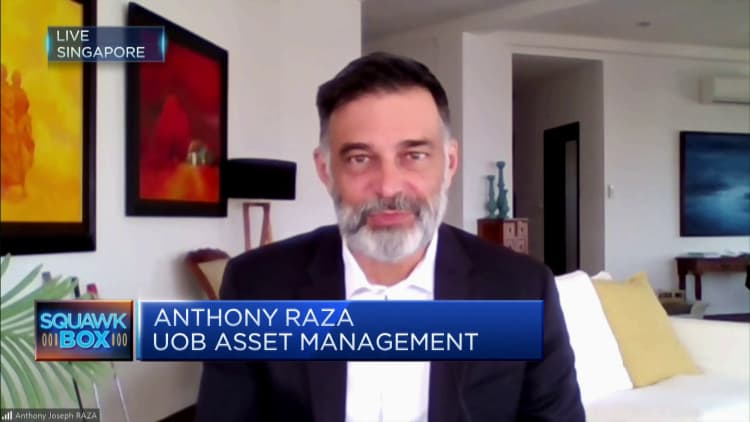
Singapore's economy grew more than expected in the third quarter compared to the same period last year, according to advance estimates released by the government on Friday.
Separately, the country's central bank tightened monetary policy for the fifth time in the past year, in line with expectations.
Gross domestic product in the July-to-September quarter came in at 4.4%, much higher than the 3.4% predicted by analysts in a Reuters poll, and in line with growth in the second quarter.
The Southeast Asian country avoided a technical recession, with quarterly GDP growth coming in a 1.5% on a seasonally adjusted basis, after a 0.2% contraction in the second quarter from the first quarter.
The Ministry of Trade and Industry in August narrowed Singapore's GDP forecast for 2022 to 3% to 4%, compared to an its previous forecast of 3% to 5%.
Singapore's economy has "a bit of wind under our wings" with events, conferences and tourism returning, Selina Ling, chief economist at OCBC, said. That will help offset weakness in the manufacturing sector, she said.
There's a high level of uncertainty in 2023, Ling said, predicting a growth range of between 1% to 3% and explaining that there are looming risks.
She pointed out that "there is downside risk depending on what happens with the major economies" and cited as an example the U.S. Fed aggressively raising borrowing costs despite a growth slowdown.
"I think that's really what is troubling a lot of people these days, at what point would the policymakers start to pivot and say that okay, the growth slowdown has gone far enough," she told CNBC's "Squawk Box Asia."
Alex Holmes, an economist at Oxford Economics, said the 1.5% quarterly jump in Singapore's GDP is unlikely to be repeated, pointing to potential recessions in export markets. Inflation and interest rates will also be headwinds for domestic demand, he said in a note.
Singapore tightens policy
Meanwhile, the Monetary Authority of Singapore tightened policy in a widely expected move, as rising costs continue to weigh on the economy.
The central bank said it will re-center the mid-point of its exchange rate policy band, known as the Singapore dollar Nominal Effective Exchange Rate, S$NEER.
Singapore controls policy through its exchange rate rather than interest rates, and can also adjust the slope and width of the band. It manages the strength or weakness of the Singapore dollar against a basket of currencies of its main trading partners.
Core inflation will stay elevated over the next few quarters, as imported inflation remains significant and a tight labor market supports strong wage increases.Monetary Authority of Singapore
The policy band is now in a "sweet spot" given worries about inflation and weaker global growth prospects, DBS Group Research analysts said in a Friday note. "Going forward, we believe the MAS will become more data dependent in future policy decisions."
For its part, the central bank's statement flagged concerns about higher prices.
"Core inflation will stay elevated over the next few quarters, as imported inflation remains significant and a tight labor market supports strong wage increases," the MAS said.
The Singapore dollar last traded at 1.4234 against the dollar.
Goods and services tax hike
On the planned goods and services tax (GST) hike slated for January 2023 and 2024, the central bank said it "will result in a one-off step-up in the price level," though its impact on inflation "should be transitory."
The MAS said that excluding the effects of the tax hike, it expects Singapore's core inflation to remain above trend at between 2.5% to 3.5% and headline inflation at between 4.5% to 5.5%. In August, core inflation rose to 5.1% while headline inflation was at 7.5%.

OCBC's Ling said factors other than the GST hike will play a bigger role in driving inflation.
The central bank "paid some reference to the GST hike, but also indicated there would be other structural factors underpinning the inflation story," she said.
"For the rest of 2023, it will come down to external prices — such as energy, natural gas, and on the domestic front," she said, pointing to a tightened labor market and increase in wages.
Late on Friday afternoon, Singapore's finance ministry announced a $1.5 billion Singapore dollar ($1.05 billion) support package, to address rising inflation. The package included cash, vouchers and public transport subsidies, and were aimed largely at helping lower and middle income citizens.


